Four candidates for police chief share their plans for Lawrence
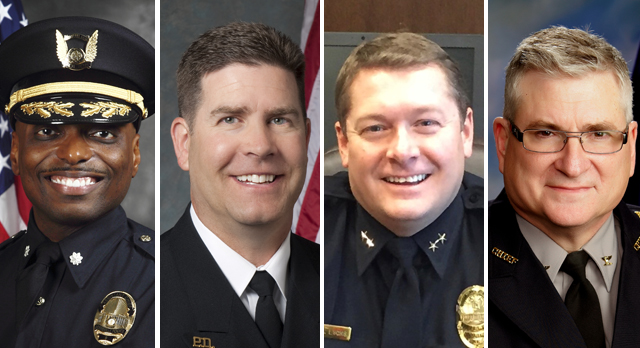
From left to right: Assistant Police Chief Gregory Burns Jr., of Louisville, Ky.; Deputy Police Chief Simon Happer, of Overland Park; Police Chief Scott Lyons, of Papillion, Neb.; and Police Chief Stephen Monticelli, of Harrisonburg, Va.
Following a visit to Lawrence, interviews with city staff and community panels, the field of candidates for Lawrence’s next police chief is about to be narrowed down.
Earlier this month, four candidates were announced as finalists for the position. In coming weeks, City Manager Tom Markus will pare that group down to two.
As that decision approaches, the Journal-World spoke with the candidates about their experiences and what they’d do if selected to be the city’s next police chief.
The police chief oversees the department’s 150 officers, 30 civilian staff members and an operating budget of $23.4 million. The starting salary for the position will be between $120,000 and $140,000, depending on qualifications.
Gregory Burns, Jr.
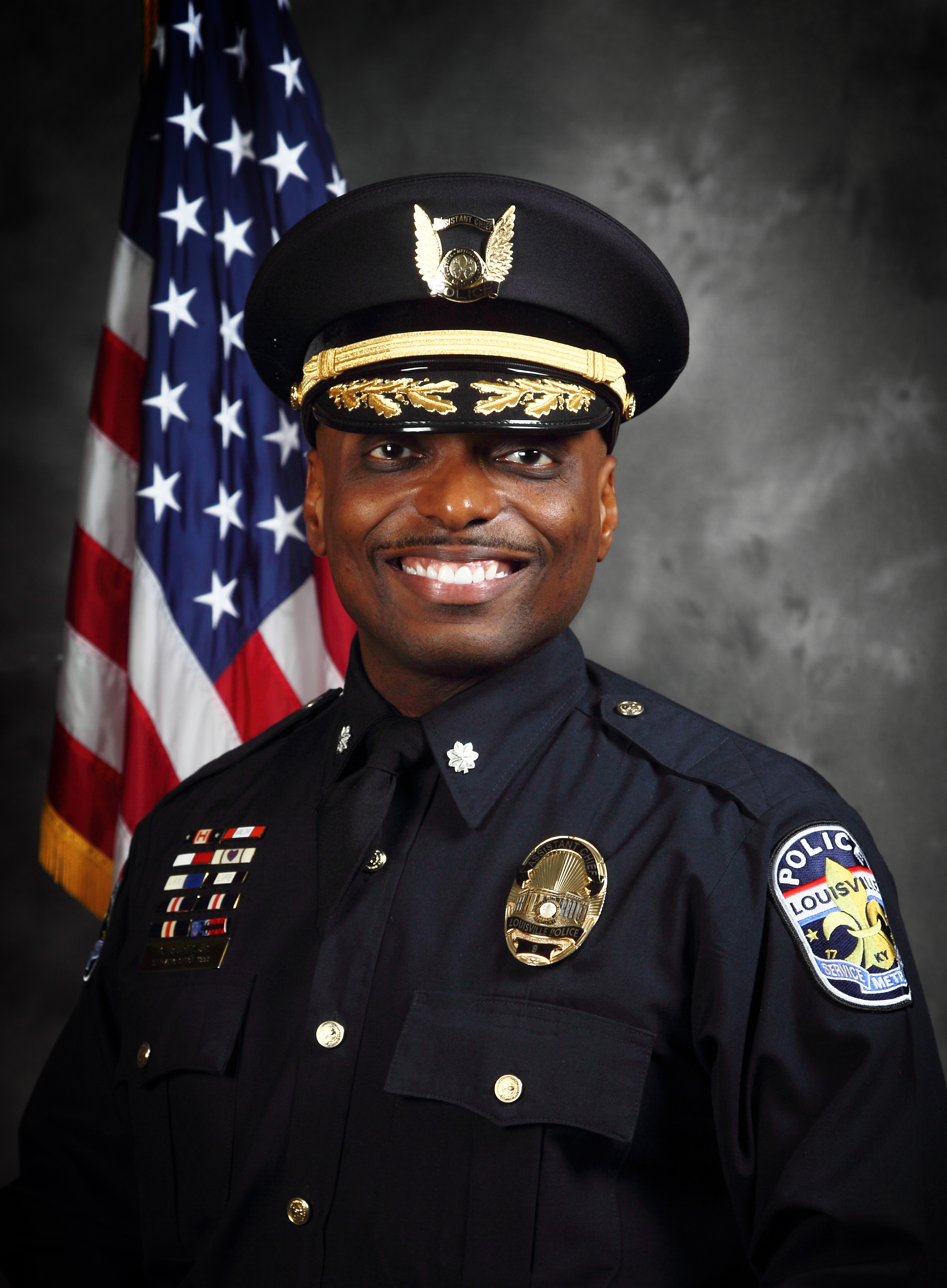
Gregory Burns, Jr.
Burns has been in law enforcement since 1993 and is assistant police chief in Louisville, Ky. Burns commands the Louisville Metro Police Department’s Support Bureau, which includes four divisions: major crimes, narcotics, community services and special operations.
Burns, who is originally from Louisville, said being a police chief has long been in his plan, and thinks his experience commanding the support bureau has prepared him for the position.
“I’m already managing a department of 460 people, already managing a budget of almost $40 million,” Burns said. “And dealing with a lot of moving pieces, handling crises every day, working with the community every day.”
Burns is a four-year veteran of the United States Air Force and began his law enforcement career with the Louisville Division of Police. He earned a bachelor’s degree in criminal justice from Bethel University.
If he is selected as chief, Burns said his top objectives would be to prevent and control crime while protecting the constitutional rights of all involved; increasing interactions between officers and the community; and improving transparency.
“You have to raise up that curtain to build that trust and legitimacy, so people know they can depend on you,” Burns said. “You can’t wait until there’s a storm to try to build a bridge; you’ve got to do that from day one. And that starts from the top and it has to permeate all the way down to the bottom of a police department.”
Before that, though, Burns said his first priority would be to get to know the people of Lawrence and the police department staff. Otherwise, he said he thinks it would be disingenuous to say he understands the issues the community and department has.
“Part of getting to know Lawrence is to find out what they perceive to be the problems,” Burns said.
Simon Happer
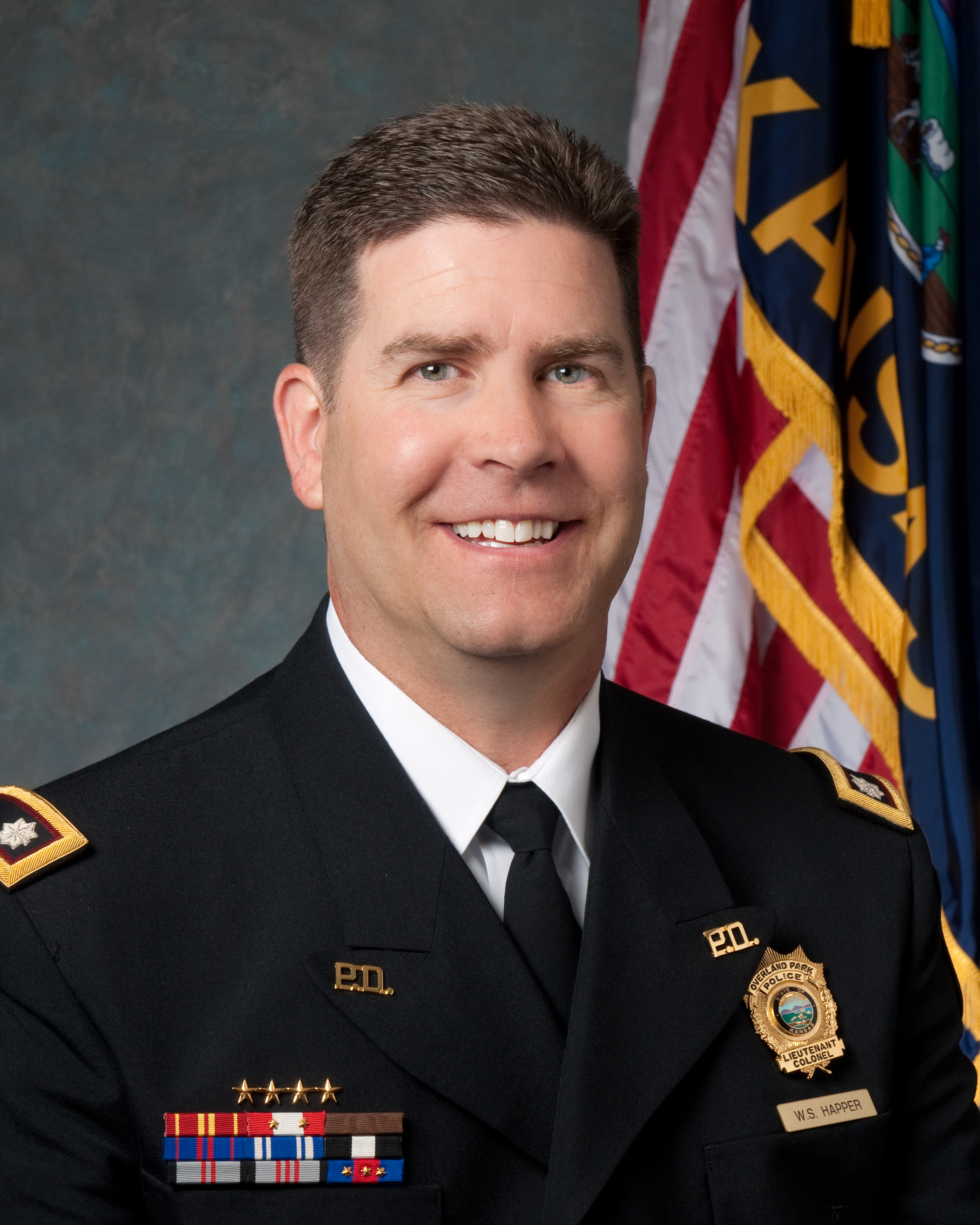
Simon Happer
Happer has served his entire 27-year law enforcement career in Overland Park, where he is currently deputy police chief.
Happer, who is originally from Overland Park, said he thinks his years in Overland Park –population approximately 190,000 –have prepared him for the chief position in Lawrence. He said he’s dealt with personnel, community issues and major events, as well as the small, everyday issues that officers encounter as part of their neighborhood assignments.
“Twenty-seven years as a police officer, moving up the ranks of the Overland Park Police Department have prepared me,” Happer said.
Last year, Happer was one of several Kansas police officers to testify against a bill, HB 2678, that would have required the attorney general to investigate and prosecute cases relating to deaths caused by law enforcement officers.
Happer commanded Johnson County’s Officer Involved Shooting Investigation Team for 11 years, where he said he oversaw about five investigations. He said that team included officers from various cities and that those investigations were all conducted by officers outside of the department being investigated. He said his issue with the attorney general’s office investigating was related to training.
“I believe in having outside entities looking at it, by all means,” Happer said. “I don’t think investigating internally is actually best practice. But you also have to have people that are trained. And we send the people that are on that team to a lot of training in interviewing officers, interviewing witnesses, putting together those case files.”
Happer earned a master’s degree in public administration from the University of Kansas. He is also a graduate of the Senior Management Institute for Police, the FBI National Academy and the IACP Leadership of Police Organizations course.
If he is selected as chief, Happer said his top objectives would be staff development and support, including working on a succession plan for when officers retire. He said part of developing officers is building relationships and trust within the community.
“We as police do not solve crimes without citizens’ help,” Happer said. “We need them to be able to come to us and tell us, ‘Hey, this is who I saw or this is what I saw.’ You want to have that open relationship with them because it is a two-way (relationship), and it’s the same thing with the media.”
Scott Lyons
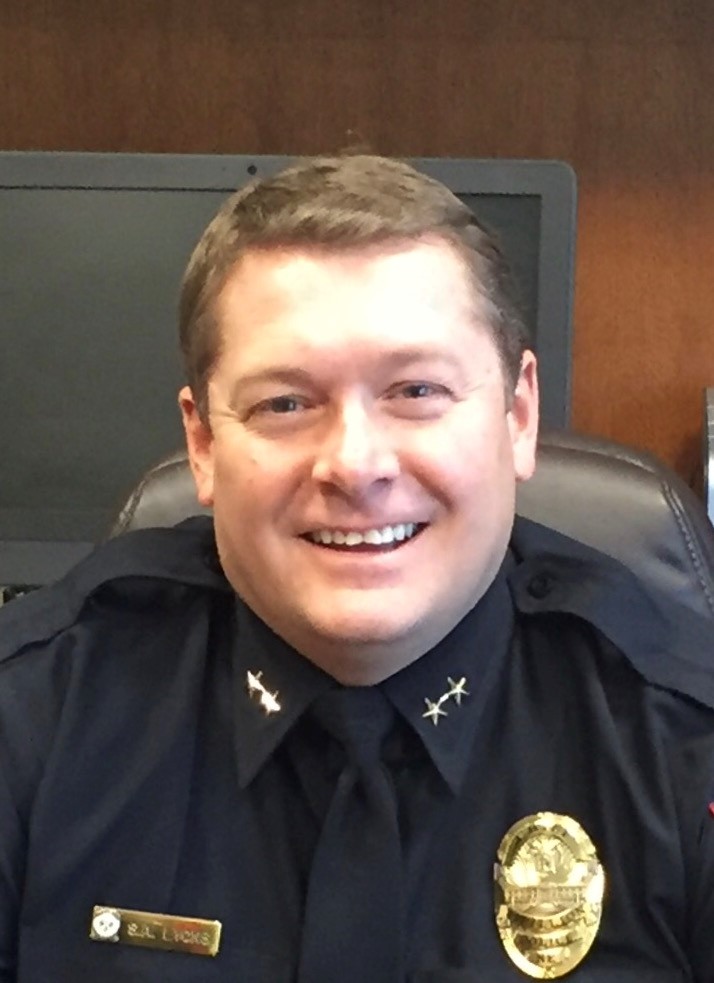
Scott Lyons
Lyons has been the police chief in Papillion, Neb., since 2015. He began his law enforcement career in 1990 at the Raytown Police Department in Missouri. He later spent 20 years with the Lee’s Summit Police Department.
Lyons, who is originally from Blue Springs, Mo., said he decided very early in his career that his ultimate goal was to be a police chief. He said he thinks he was prepared for his position as chief in Papillion — population about 19,500 — by his years in Lee’s Summit, where he learned how to manage the budget, employees and construction projects of a growing community. Now he said he thinks he’s prepared to have that role in Lawrence.
“I knew that I needed to become a police chief maybe of a smaller organization to have the opportunity someday to move to a larger organization,” Lyons said.
Lyons earned his master’s degree in Criminal Justice Administration from the University of Central Missouri. He is also a graduate of two police leadership and command schools, FBI National Academy and the Northwest University School of Police Staff and Command.
Lyons is one of seven defendants — including the City of Papillion and Sarpy County — in a civil rights lawsuit brought by Stacey and Wadith Nader. The lawsuit alleges Wadith Nader’s rights were violated when he was “unconstitutionally seized” in response to child pornography allegations. Law enforcement were responding to an alert that indicated images that could be child pornography were uploaded using his email address, but charges in the case were later dismissed. In a response to the lawsuit, the defendants have denied Nader’s claims.
Lyons said he couldn’t say much about the case because it’s still ongoing.
“I really can’t talk a whole lot about the actual case because it’s in the court system right now,” Lyons said. “I would point out that that case was developing even before I became the police chief. The actual execution of that case, the search warrant, was several weeks after I became the chief of police in Papillion.”
If he is selected as Lawrence police chief, Lyons said one of his top objectives would be to improve community policing by increases officers’ contact with residents outside of crime. He said examples include having events such as “coffee with a cop” and attending the meetings of neighborhoods and community groups, including minority groups.
Lyons said that kind of contact is really important, especially for a community like Lawrence because a lot of issues are not going to come over the 911 system.
“Through community engagement you get more proactive police involvement,” Lyons said. “You find when we’re not answering 911 calls we’re concentrating on issues of real importance. And so it gets you out of the react part of policing and puts police officers in position where they can make the most impact.”
Stephen Monticelli
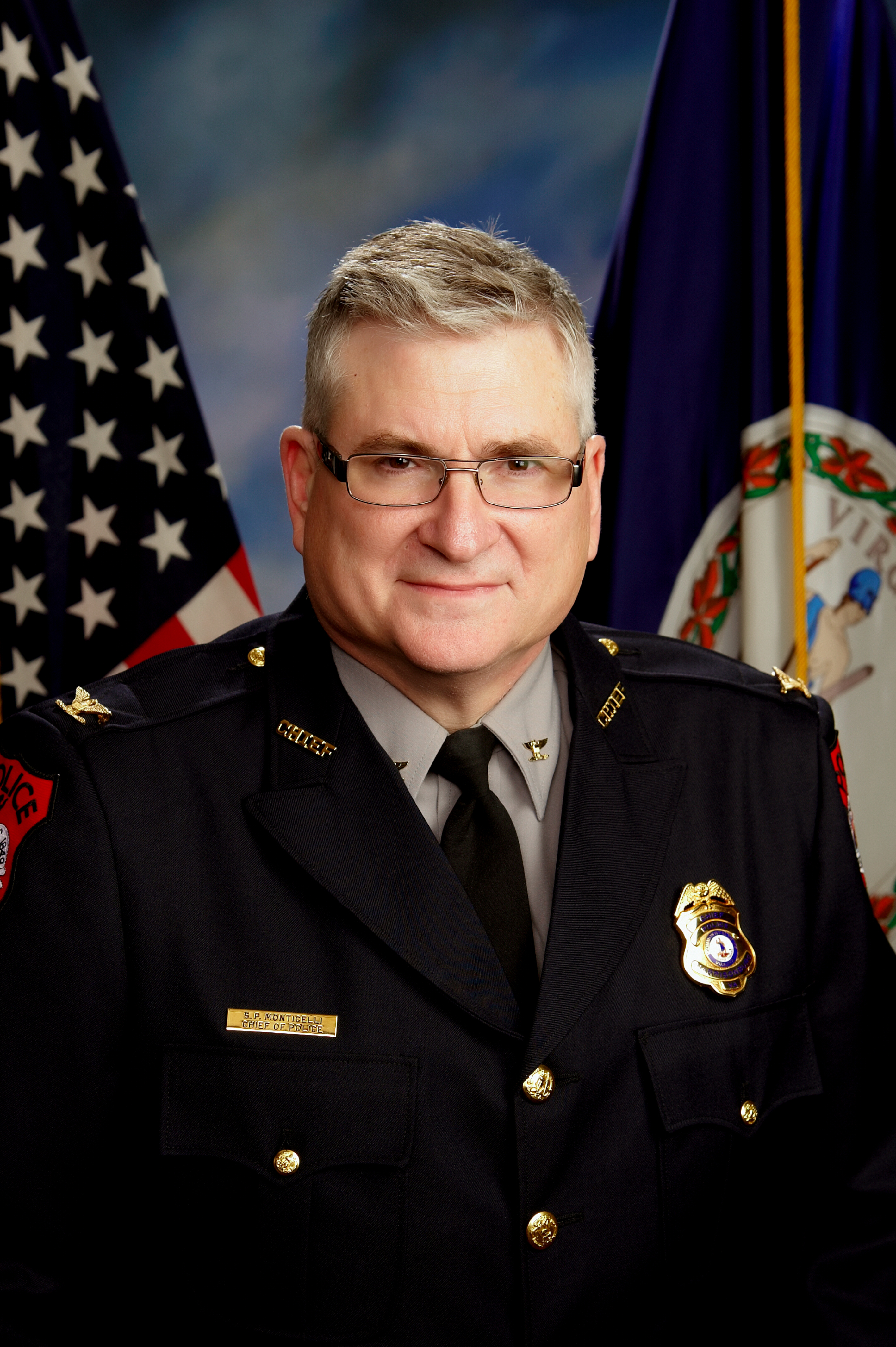
Stephen Monticelli
Monticelli has spent 37 years in law enforcement. He has been the police chief in Harrisonburg, Va. — population about 53,000 — since 2012. Monticelli, originally from Saint Louis, served for 11 years with the University of Missouri Police Department in Columbia, Mo., before joining the Columbia Police Department.
With nearly four decades of police work behind him, Monticelli said he thinks his experience working under seven police chiefs has helped prepare him for the job in Lawrence. He said his plan would be to bring those lessons to Lawrence to help make the police department better.
“I’ve taken a lot from each one of those chiefs,” Monticelli said. “You find out what works and you find out what doesn’t work so well.”
Monticelli earned a master’s degree in business administration from William Woods University. In 2012, he graduated from the Law Enforcement Executive Certification School at Northwestern Virginia Criminal Justice Training Academy.
Following his time working in Columbia, Monticelli was a party in civil rights lawsuit involving Ryan Ferguson. Ferguson was found guilty in 2005 of second-degree murder and first-degree robbery, but the convictions were vacated eight years later because the prosecution didn’t disclose information to the defense, according to the Columbia Missourian. Monticelli was one of several defendants dismissed from the pending case without prejudice, meaning he could be re-added.
Monticelli said the lack of disclosure — called a Brady violation — occurred when one of the investigators who was working for the county prosecutors office talked to a witness and failed to write a report. He also said the case couldn’t be brought back to trial because the two primary witnesses recanted their original statements.
“The public looks at that as, ‘Oh, they arrested the wrong man,'” Monticelli said. “Well no, they just can’t try the individual that they believe is responsible for the case because there is no physical evidence and witnesses that can be put on the stand anymore.”
If he is selected as chief, he said the first major task would be to learn about the community and the department. Monticelli said he loves police work, and that he’d like the police department to focus on its interactions with residents.
“What I do here is try to make the best environment for our personnel, both civilian and police officers,” Monticelli said. “And that’s my goal for the public, for our department to provide the best customer service we can provide the community.”
Correction: A previous version of this story was unclear regarding Monticelli’s work history. Monticelli served for both the University of Missouri Police Department in Columbia, Mo., and the Columbia Police Department.







